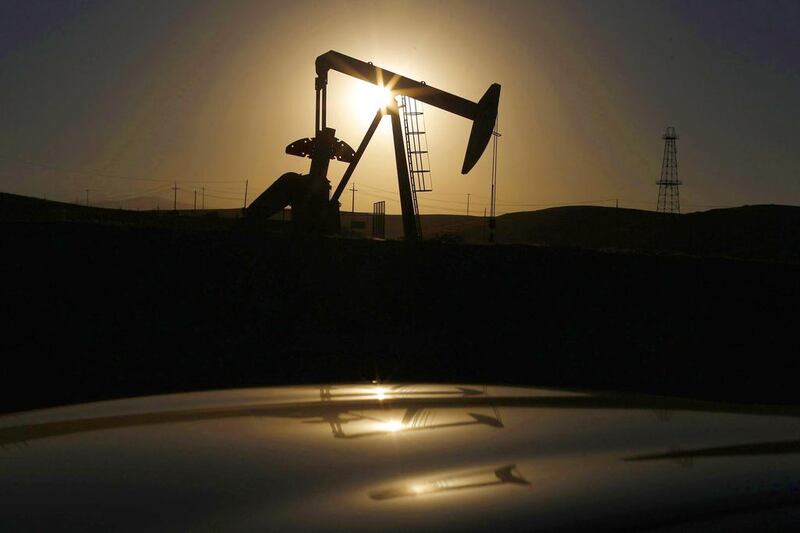Dubai-based Dragon Oil has scrapped a £492 million (Dh2.84 billion) deal to take over rival Petroceltic, blaming it on the drop in oil prices that have fallen to five-year lows of about US$65 a barrel.
“Dragon Oil now confirms that, in the light of prevailing market conditions, it no longer intends to make an offer for Petroceltic,” the firm said in a statement.
Dragon Oil, listed in London, had made a 230 pence-a-share cash offer for London-listed for Petroceltic in October.
Dublin-based Petroceltic’s shares dived on the news. They lost 40 per cent to 105.25 pence in early trade in London.
Brent crude lost 1 per cent to $69.43 a barrel yesterday on worries about an oil supply glut and slow global economic recovery.
West Texas Intermediate fell 1.38 per cent to $65.24.
Brent has shed about 40 per cent of its value since hitting a year high of $115 a barrel in June.
Prices started plunging further last week after Opec, which pumps more than a third of the world’s oil, decided to keep its crude production ceiling unchanged, despite sliding prices and oversupply in the oil market.
Although the Petroceltic deal was scrapped, the drop in oil prices could lead to more M&A activity as low valuations encourage companies flush with cash to snap up good assets, according to Werner Riding, an analyst at London-based brokerage Peel Hunt.
“Current market valuations in some instances are now very low and so if the equity selloff continues and we see the market not being prepared to recognise asset value then I wouldn’t be surprised if M&A activity begins to pick up, particularly for those companies that have high-quality assets that would be attractive from a strategic perspective to larger industry players,’’ he said.
Petroceltic, which has existing operations in Algeria, Bulgaria, Egypt, Greece, Italy, and Iraq’s Kurdish region, expected a drop in its oil price, a spokesman said.
“The share price was inevitably going to be affected because there was a bid premium for the share price,” said a Petroceltic spokesman.
The cancellation of the takeover deal means that Dragon Oil, which is 54 per cent owned by the Dubai government, will have to look elsewhere to help diversify its assets away from its main operations in Turkmenistan. Currently all of Dragon Oil’s income comes from its Cheleken field, offshore Turkmenistan.
“The Dragon board understands its responsibility to create value for shareholders in acquisition deals and its role as a custodian of shareholders’ money,’’ a Dragon Oil spokesman said. “Over the years the Dragon board and senior management have demonstrated to the market its prudence in M&A [mergers and acquisitions] and it values investors’ trust in its ability to do the right deal.”
Dragon Oil, which has exploration blocks in Tunisia, Iraq, Afghanistan, Egypt and the Philippines, has been scouring for exploration and production assets in Africa, parts of Asia and the Middle East to have a more balanced portfolio.
Dragon Oil profit rose 20 per cent in the first half of this year to US$289 million from $241.4m in the year earlier period. It is targeting a 5 to 10 per cent increase in oil production to between 87,000 barrels per day (bpd) and 90,000 bpd for 2014. The firm has a goal to reach 100,000 bpd at the end of 2015, and maintain this level for a minimum of five years. In September, Dragon and Italy’s Enel won two exploration blocks in Algeria.
Separately, Petroceltic, which is seeking to develop operations in North Africa, the Mediterranean Basin and Black Sea, said its gas operations in Algeria will not be affected by the oil price drop.
“It is noteworthy that the company’s flagship gas condensate project in Algeria, which is expected to start production in 2018, is unlikely to be affected by the current volatility in crude oil markets, given the forecast level of oil prices at that time,” Petroceltic said in a statement on its website. “Additionally, the majority of Petroceltic’s current production is sold at a fixed gas price in Egypt, and is therefore unaffected by short-term oil price volatility.”
dalsaadi@thenational.ae
Follow The National's Business section on Twitter





